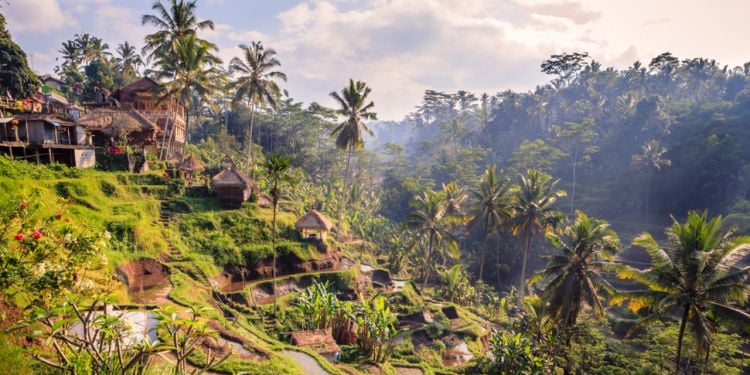
Settling in Bali
Upon arrival, Bali's international airport, Ngurah Rai, will give you a glimpse of what to expect on the island of the Gods: a crowded, hot, but welcoming and smiling country. Whatever the case, you'll be comfortable in your new environment after a few adjustments, thanks to our tips and practical information.
With approximately 5 million tourists visiting Bali each year, traffic can be chaotic with countless cars, bicycles and buses on the road at all times. Added to this are ceremonies that require road closures, causing a domino effect in other parts of the island.
Over time, you will get used to efficiently using Bali's modes of transportation, such as cabs, which are numerous and easily accessible on the streets or through applications such as Gojek or Grab, or bike and motorcycle rentals.
The Balinese culture is rich and vibrant. The joyful ambient sounds, the heat, and a color fest will greet you as soon as you land at the airport. Grab the opportunity to make a first dive through the exotic sculptures to be admired at each corner of the buildings, the vibrant colors of the canang (flower offerings) which decorate the road.
The climate in Bali
In Bali, a tropical island that lives up to its name, it is always sunny, with an average annual temperature of 31°C. The rainy season ranges from January to April and from October to November, with high humidity and short showers, usually in the afternoon.
Daily life in Bali
As a tourist destination, Bali has everything to meet the needs of foreigners, including accommodation for all budgets. While waiting to find a place to stay, consider a guesthouse or hotel. For your budget, expect to pay up to 9 USD for a night in a hostel and up to 100 USD in a more upscale hotel.
To be able to communicate by phone and/or via internet, you just have to buy a SIM card at the airport or in one of the numerous mini-markets (Indomaret, Alfa Mart, Minimart and Circle K) scattered all over the island. By the way, these small grocery stores are quite common and stay open up till 10 pm, 24 hours a day! You'll find a pretty comprehensive range of products from basics to cleaning supplies, and will probably get to know your neighborhood. Some of the larger markets, like Pepito, also offer fresh produce, including eggs, vegetables and fruit, meat, as well as phone recharge cards, bill pay stations, and more. To buy everything in one trip, go to a major hypermarket such as Grand Lucky, Carrefour or Hypermart, which offer local and imported products.
Tap water in Bali is not safe to drink, so much so that in some areas, drinking water is considered a luxury. Most households buy drinking water in gallons for daily use. Cooking is done with gas sold in cylinders.
Another challenge of living in Bali is the internet connection speed. Most villas, accommodations and cafes now offer Wi-Fi, but the speed is still very slow compared to other Asian countries, such as Thailand, Malaysia and Singapore. If your work requires a stable and fast internet connection, you can join a coworking space, which will offer you a reliable and comfortable work spot. Spaces such as Dojo Bali, those in Canggu, Hub Bali in Legian or Jimbaran Hub in Jimbaran offer flexible subscriptions with daily, weekly or monthly packages. Note that some of these coworking spaces closed their doors at the beginning of the Covid-19 pandemic in Indonesia and still haven't reopened. Inquire online to learn more about the status of the coworking space you are interested in.
Electricity and water supplies are often interrupted without notice. For this reason, many homes are equipped with their own water tanks.
The cost of living in Bali
With regard to the cost of living in Bali, it is wrong to believe that it is cheap! Nevertheless, it is still possible to save money by eating in small restaurants (warung) and sleeping in a kos (dormitory). If you want to have a western lifestyle, the cost will depend on the region, and be aware that those with a large expatriate population will tend to be more expensive. Otherwise, for a one-bedroom apartment in Bali, you should expect to pay USD 490 per month, compared to USD 1,500 per month, excluding utilities and maintenance, for a villa with a pool. Moreover, the rent in such a case is paid on a yearly basis at the time of entry into the accommodation!
On the food side, a full meal in Canggu ranges between $10 and $15 per meal. For a night out at high-end beach clubs like Potato Head or Omnia, you will be charged between 150 and 200 USD.
Best, if you don't feel like living beyond your means, consider the night markets in Bali. These are not only a cultural spectacle in their own right, but they also offer good value dinners.
These are ideal places to sample a variety of local dishes while immersing yourself in the authentic Bali way of life!
We do our best to provide accurate and up to date information. However, if you have noticed any inaccuracies in this article, please let us know in the comments section below.








